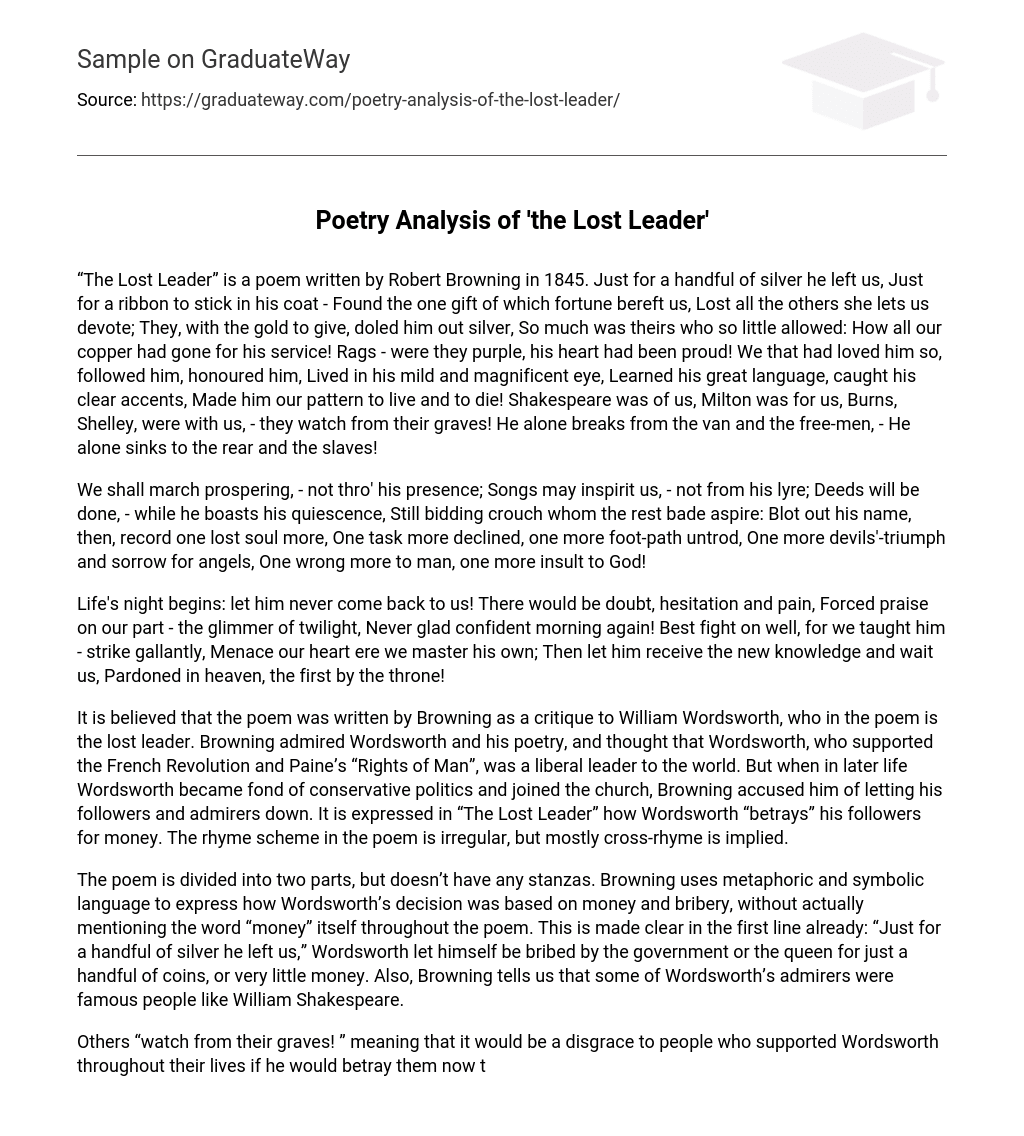“The Lost Leader” is a poem written by Robert Browning in 1845. Just for a handful of silver he left us, Just for a ribbon to stick in his coat – Found the one gift of which fortune bereft us, Lost all the others she lets us devote; They, with the gold to give, doled him out silver, So much was theirs who so little allowed: How all our copper had gone for his service! Rags – were they purple, his heart had been proud! We that had loved him so, followed him, honoured him, Lived in his mild and magnificent eye, Learned his great language, caught his clear accents, Made him our pattern to live and to die! Shakespeare was of us, Milton was for us, Burns, Shelley, were with us, – they watch from their graves! He alone breaks from the van and the free-men, – He alone sinks to the rear and the slaves!
We shall march prospering, – not thro’ his presence; Songs may inspirit us, – not from his lyre; Deeds will be done, – while he boasts his quiescence, Still bidding crouch whom the rest bade aspire: Blot out his name, then, record one lost soul more, One task more declined, one more foot-path untrod, One more devils’-triumph and sorrow for angels, One wrong more to man, one more insult to God!
Life’s night begins: let him never come back to us! There would be doubt, hesitation and pain, Forced praise on our part – the glimmer of twilight, Never glad confident morning again! Best fight on well, for we taught him – strike gallantly, Menace our heart ere we master his own; Then let him receive the new knowledge and wait us, Pardoned in heaven, the first by the throne!
It is believed that the poem was written by Browning as a critique to William Wordsworth, who in the poem is the lost leader. Browning admired Wordsworth and his poetry, and thought that Wordsworth, who supported the French Revolution and Paine’s “Rights of Man”, was a liberal leader to the world. But when in later life Wordsworth became fond of conservative politics and joined the church, Browning accused him of letting his followers and admirers down. It is expressed in “The Lost Leader” how Wordsworth “betrays” his followers for money. The rhyme scheme in the poem is irregular, but mostly cross-rhyme is implied.
The poem is divided into two parts, but doesn’t have any stanzas. Browning uses metaphoric and symbolic language to express how Wordsworth’s decision was based on money and bribery, without actually mentioning the word “money” itself throughout the poem. This is made clear in the first line already: “Just for a handful of silver he left us,” Wordsworth let himself be bribed by the government or the queen for just a handful of coins, or very little money. Also, Browning tells us that some of Wordsworth’s admirers were famous people like William Shakespeare.
Others “watch from their graves! ” meaning that it would be a disgrace to people who supported Wordsworth throughout their lives if he would betray them now that they are dead. In the second part of the poem the poet concentrates on how the lost leader is “one more devil’s triumph” The poet thinks that the lost leader’s actions were against mankind, and that they strictly opposed what in his opinion is “good”. Throughout the poem, to there are to “sides”, the “good” which are Wordsworth’s past followers, and the “bad”, which is mainly Wordsworth, but also his bribers.
The poet points this out by using constant repetition on the one hand of the words “we” and “us”, and on the other hand “his” and “he”. For emphasis, the poet uses an exclamation mark at the end of a line. For example, “Made him our pattern to live and to die! ” shows how Wordsworth’s followers lived for his legacy. Browning’s purpose for the poem was to tell the public about how Wordsworth betrayed his followers and his previous views. He is clearly unhappy about how Wordsworth betrayed his followers and his previous views, and also his religious and political opinions, for the sake of money.
Browning reminds the reader about how Wordsworth was a liberal leader, supporting change, who now is lost to the world. Originally, Browning writes about how Wordsworth changes his views and opinions, because he is offered money. But in my opinion it pretty much describes, in an old-fashioned way, any hypocrite. Personally, it reminds me of Robert Mugabe, who fought for equal rights in Zimbabwe. Once he was in power, he abused it for his own good, while he suppressed the population. So, as in the poem the liberal leader lets his followers down for his own welfare.





